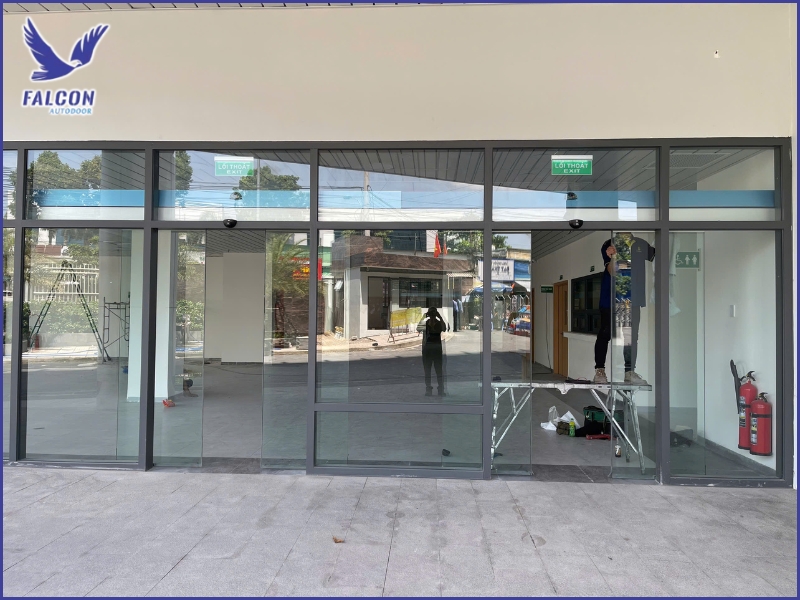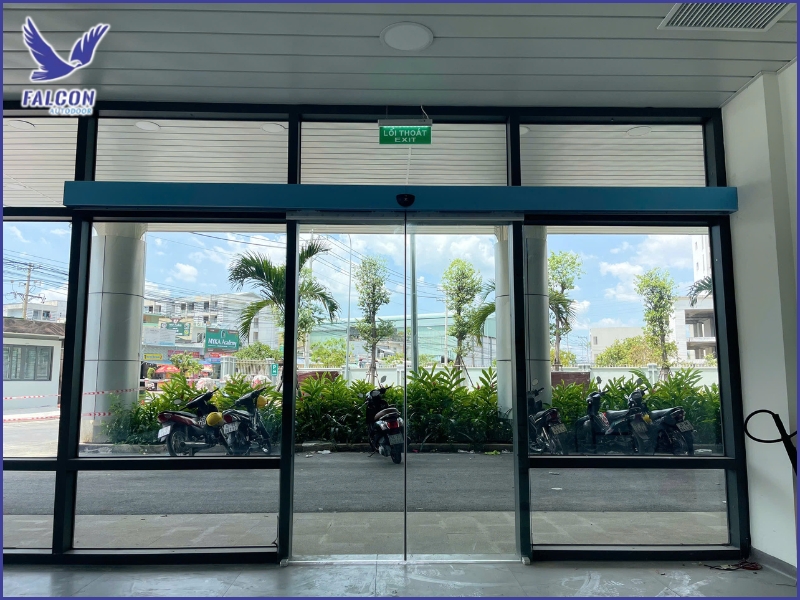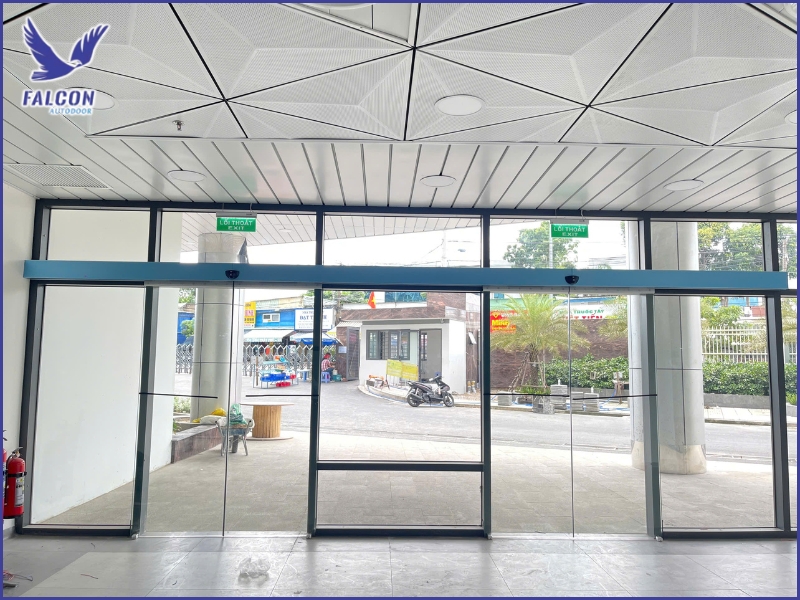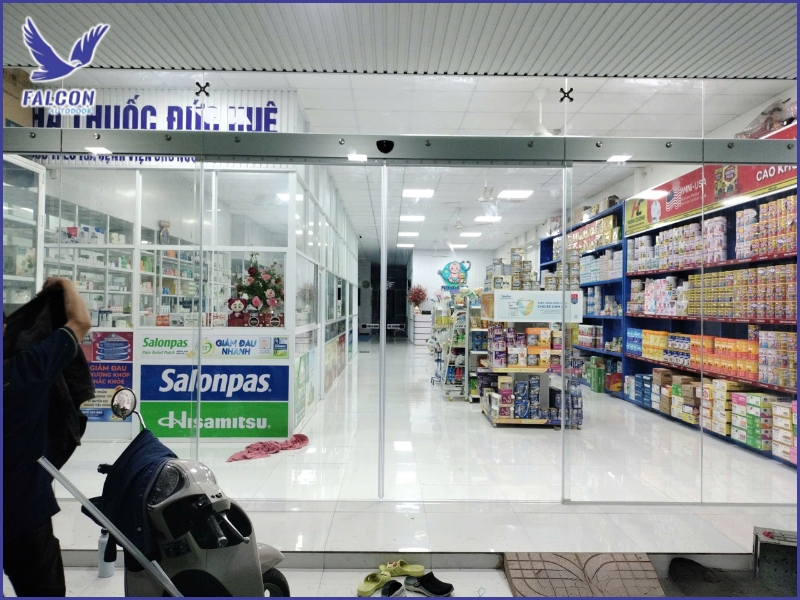Why hospitals should use sensor automatic doors
In hospital environments where hygiene, safety, and convenience are top priorities, sensor automatic doors are increasingly adopted to streamline operations and control traffic flow. In this article, Thuy Linh Long explains why this door system has become the preferred choice for modern healthcare facilities.
1. Sensor automatic doors - A modern solution for hospitals
In areas with high foot traffic and strict hygiene requirements, sensor automatic doors offer outstanding convenience compared to traditional ones. They enable full automatic opening and closing while minimizing physical contact, ensuring safety for both patients and healthcare staff in every situation.
1.1 Structure and working principle
Sensor automatic doors consist of key components such as infrared or radar sensors, a drive motor, a central controller, and sliding rails. When motion is detected in the sensor’s range, the system sends a signal to the motor to open the door smoothly, then automatically closes it when no further movement is detected.
1.2 Common types of sensor doors used in hospitals
Each hospital area has unique requirements, so choosing the right type of door ensures efficiency and hygiene.
- Automatic sliding doors: Ideal for entrances, corridors, or outpatient areas with high traffic.
- Automatic swing doors: Suitable for smaller passages or secondary entrances.
- Hermetic doors: Designed for operating rooms and cleanrooms to maintain sterility.
- Curved sliding doors: Commonly used at main lobbies or reception areas for aesthetics and accessibility.

2. Benefits of using sensor automatic doors in hospitals
Installing sensor automatic doors is not just a modernization trend but also a practical solution that enhances safety, optimizes workflow, and creates a better environment for patients and staff.
2.1 Reducing the risk of cross-contamination
In sterile environments, every touchpoint can carry bacteria or viruses. With sensor doors, users don’t need to touch handles the doors open automatically and close right after passage. This helps minimize infection risks, especially in clinics, ICUs, and operating rooms.
2.2 Improving movement efficiency
Hospitals have constant movement of patients, staff, wheelchairs, and stretchers. Sensor doors allow smooth, hands-free passage, saving time and ensuring safer transport during emergencies. They also reduce congestion in busy corridors and entrances.
2.3 Enhancing a hospital’s professional image
A door that operates quietly and responsively creates a strong first impression of professionalism and care. It reflects the hospital’s commitment to quality and modernity, helping patients and visitors feel comforted and confident upon entry.

3. Practical applications of sensor automatic doors in hospitals
Sensor automatic doors are widely used in nearly every hospital zone for their safety, flexibility, and hygiene compliance. Proper door selection for each area ensures smooth medical operations and supports a clean, efficient working environment.
3.1 Operating rooms and cleanrooms
For sterile areas, hermetic doors are the ideal choice. These doors close tightly to maintain positive air pressure, block fine dust and bacteria, and reduce noise during surgeries. This ensures medical environments meet international cleanliness standards.
3.2 Emergency rooms, ICUs, and main corridors
In high-traffic zones, automatic sliding doors provide fast, stable, 24/7 operation. Their quick response helps staff transport patients smoothly without obstruction, an essential feature for emergency and critical care departments.
3.3 Reception and hospital lobbies
Beyond functionality, sensor doors at lobbies enhance visual appeal and energy efficiency. They help maintain indoor air conditioning, reduce noise, and deliver a welcoming, modern impression for patients and visitors.

4. Key criteria for choosing suitable sensor automatic doors for hospitals
To ensure reliability, safety, and durability, hospitals must select door systems that meet both performance and hygiene standards. A well-matched door setup minimizes maintenance costs and extends operational lifespan.
4.1 Sensor sensitivity and opening speed
Fast response time is critical in medical settings where seconds matter. High-quality sensors detect motion instantly and trigger smooth, accurate opening, ensuring accessibility and safety during urgent patient transfers.
4.2 Door material and antibacterial properties
Doors should be made from tempered glass, stainless steel, or powder-coated aluminum for durability and easy cleaning. Surfaces treated with antibacterial nano-coatings prevent microbial buildup, maintaining hygiene in disinfected areas.
4.3 Durability, quiet operation, and continuous performance
Since hospital doors operate frequently, motors must be durable and silent. Sliding tracks and rollers should be made from high-grade, wear-resistant materials for long service life and reliable 24/7 performance without disturbance.

Sensor automatic doors not only add convenience but also play a key role in building a cleaner, safer, and more professional hospital environment. With intelligent motion control and hands-free operation, they are the ideal solution for healthcare facilities striving for international standards.
If you are looking for a reliable provider and installer of hospital-grade automatic doors, Thuy Linh Long is your trusted partner. We specialize in Falcon automatic doors high-quality, aesthetically designed systems that guarantee smooth operation and absolute safety. Contact us today for expert consultation and detailed quotations tailored to your project.
THUY LINH LONG SERVICES TRADING COMPANY LIMITED
DISTRIBUTOR
Address: 243D Vuon Lai Street, Phu Tho Hoa Ward, Tan Phu District,
Ho Chi Minh City, Vietnam.
Tel: +84 28 22497999
E-mail: cuatudong24h@gmail.com
SUPPLIER
KUM YANG MATERIALS CO.,LTD
Address: 124-60, Myeongdong-ro, Hallim-myeon,
Gimhae-si, Gyeongsangnam-do, 50851, Korea.
Tel: 82-55-345-8380










